【Event Report】Addressing Every Alarm:A Symposium on Clinical Practice and Policy Dialogue in Suicide Prevention

(From left to right: Deputy Director Li Chong-Hsi, Health and Welfare Policy Research Center, Taipei Medical University; Chairperson Lü Shu-Chen, Taiwan Suicide Prevention Society; Director Lee Po-Chang, Health and Welfare Policy Research Center, Taipei Medical University; Director-General Chen Po-Hsi, Department of Mental Health, Ministry of Health and Welfare; Director Hung Shan, Addiction and Suicide Prevention Center, Taipei Medical University Hospital; and Senior Clinical Psychologist Huang Yi-Lin, Department of Psychiatry, Taipei Medical University Hospital)
On September 24, 2025, the Health and Welfare Policy Research Center of Taipei Medical University convened the seminar “Catching Every Warning Signal: Clinical Practice and Policy Dialogue on Suicide Prevention.” The event focused on the overall development and systemic responses to suicide prevention, comprehensively examining Taiwan’s current challenges—from government actions and trend data to psychiatric clinical practice and psychological counseling—and putting forward corresponding policy recommendations.
Director Lee Po-Chang, Health and Welfare Policy Research Center, TMU
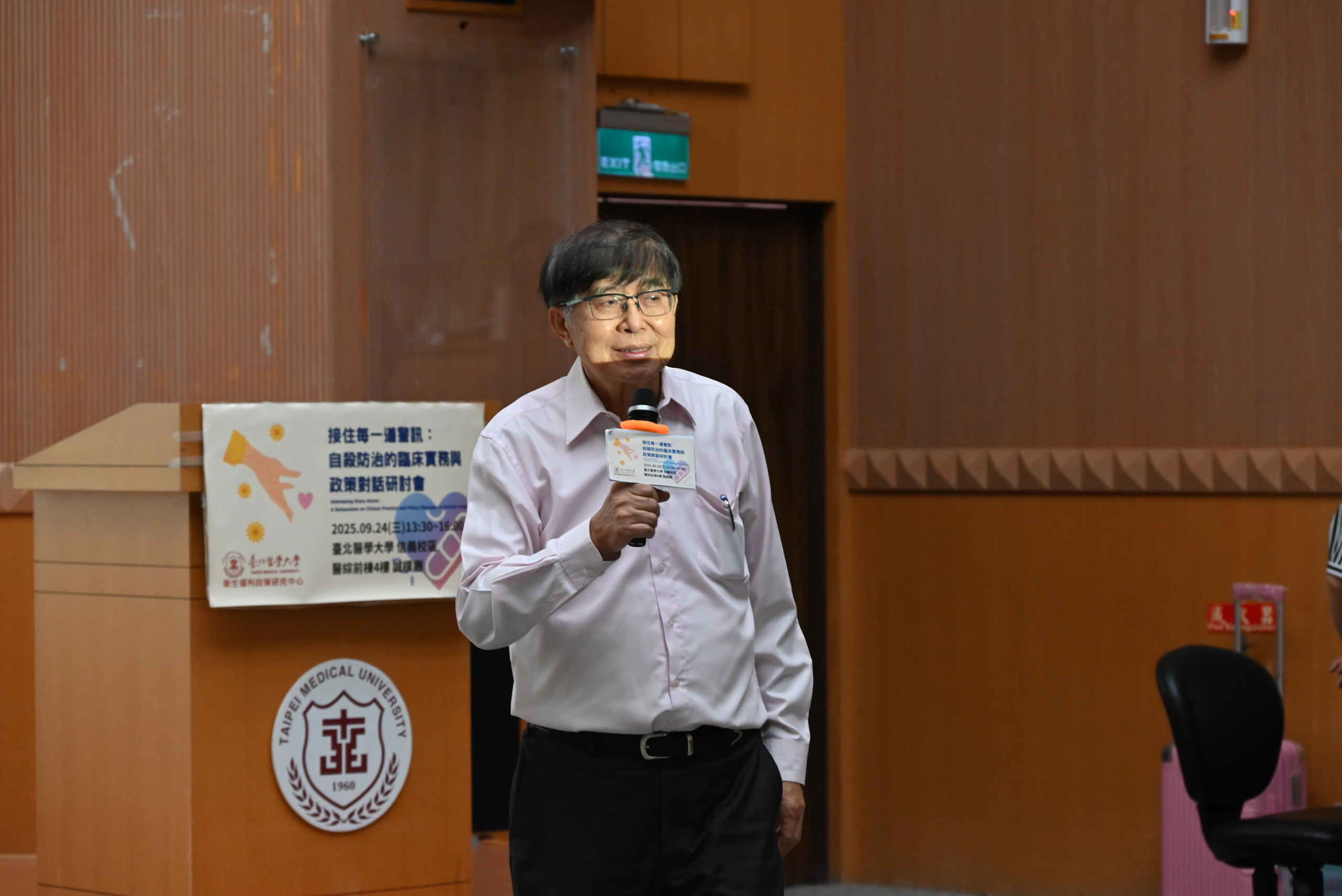
In his opening remarks, Director Lee emphasized that suicide prevention is a critical issue of public concern, not only relating to public health but also profoundly affecting community safety and people’s mental well-being. This seminar gathered experts from medicine, psychology, civil society, and government to engage in in-depth dialogue on suicide prevention. Director Lee expressed his hope that today’s discussions would unite cross-disciplinary wisdom and efforts to develop more effective prevention strategies.
Chairperson Lü Shu-Chen, Taiwan Suicide Prevention Society
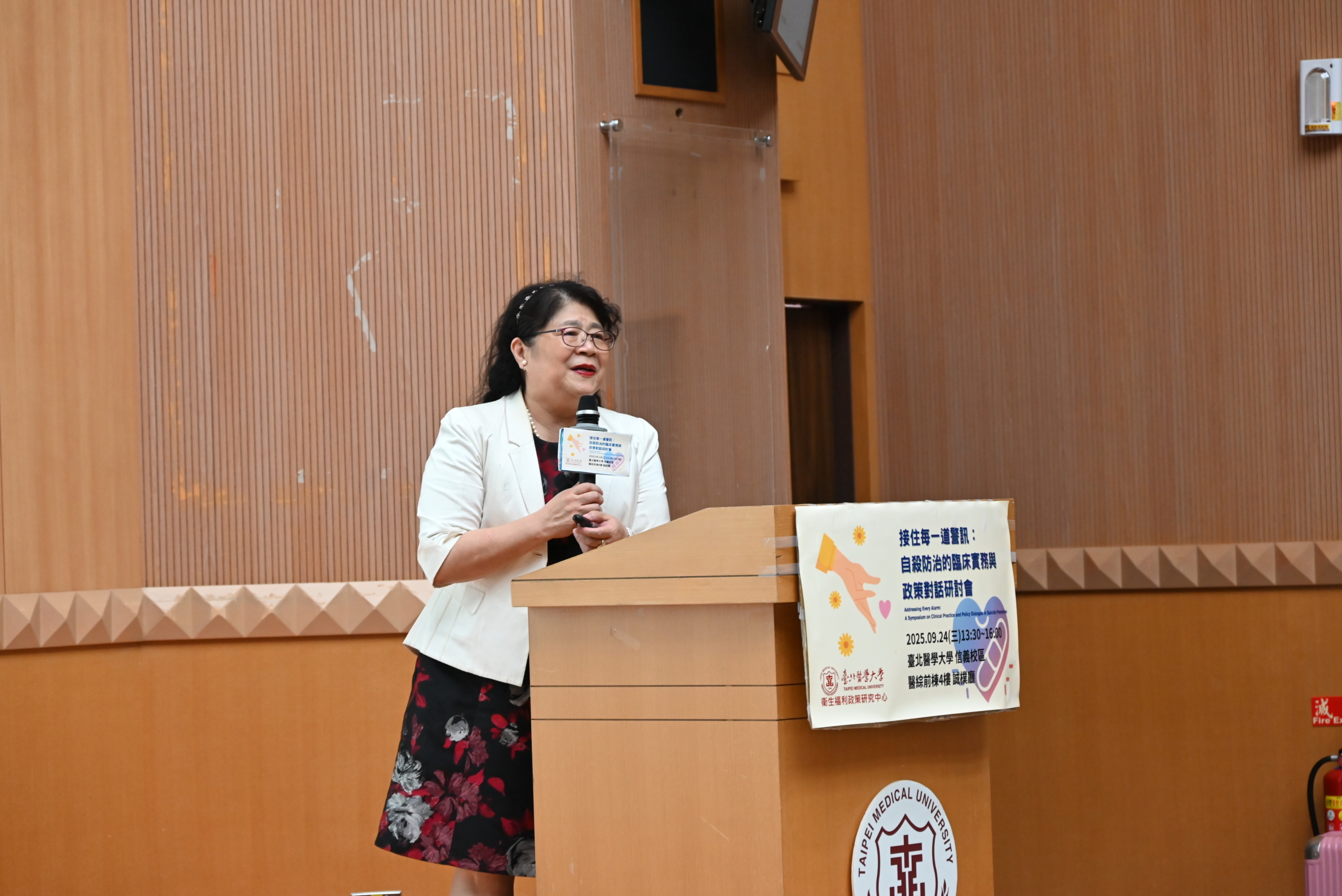
Chairperson Lü highlighted statistics from the National Suicide Prevention Center showing that since 2021, suicide numbers have risen yearly, reaching 4,062 deaths in 2024. Among them, suicides increased by 5.4% in the 15–24 age group, 9.2% in the 25–44 group, and 4.5% in the 45–64 group, indicating growing risks among youth and middle-aged adults. Methods such as hanging, strangulation, and suffocation remain the leading causes, while charcoal burning and jumping from heights have also risen significantly. Men are 1.7 times more likely to die by suicide than women.
The data reveal different causes by age: adolescents are often affected by academic pressure, peer and family issues; middle-aged groups face relationship stress, workplace pressure, and debt; while older adults are often burdened by chronic illness. Over 40% of suicides are associated with depression or other mental illnesses. However, only 26.9% of suicide decedents had ever been included in the suicide follow-up care system, leaving many—especially men and older adults—outside the safety net. Chairperson Lü stressed that suicide prevention requires public-private collaboration. Although most citizens acknowledge its importance, the “2024 Suicide Prevention Awareness Survey” showed low awareness of resources such as the 1925 hotline and low willingness to seek help. She called for society to act as “gatekeepers” through cross-sector cooperation to bring hope to those in distress.
Director-General Chen Po-Hsi, Department of Mental Health, MOHW
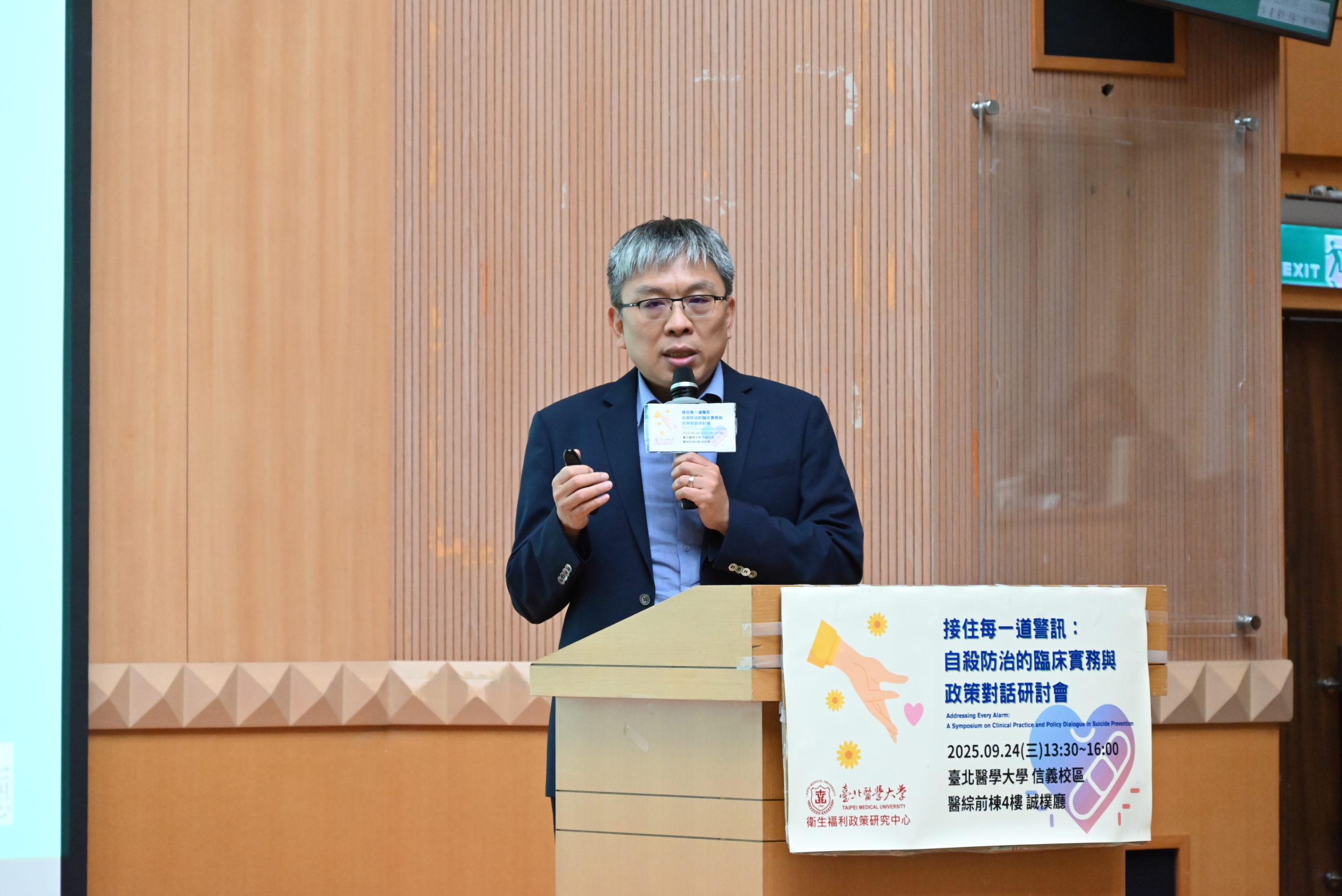
Director-General Chen emphasized that enhancing mental resilience among young and working-age populations is a core focus of Taiwan’s mental health policy. The government is accelerating diverse support measures—from real-time crisis support and integrated youth services to systematic early intervention. International models such as the U.S. 988 Suicide & Crisis Lifeline, Canada and Ireland’s youth one-stop centers, and the U.K.’s school-based support teams have informed Taiwan’s initiatives.
Policies include three free counseling sessions for individuals aged 15–45 (over 70,000 sessions delivered in the past year, with more than 20,000 high-risk cases referred), the 1925 toll-free hotline, online counseling platforms, and 388 community mental health centers. The government is expanding these centers from 61 today to 71 in 2025 and 100 by 2028. Special outreach programs for adolescents with severe mental illness are being launched to integrate medical, social, and educational resources. Chen stressed that mental health is a shared responsibility, urging multi-sectoral cooperation and community engagement to strengthen prevention networks and resilience.
Director Hung Shan, Addiction and Suicide Prevention Center, TMU Hospital
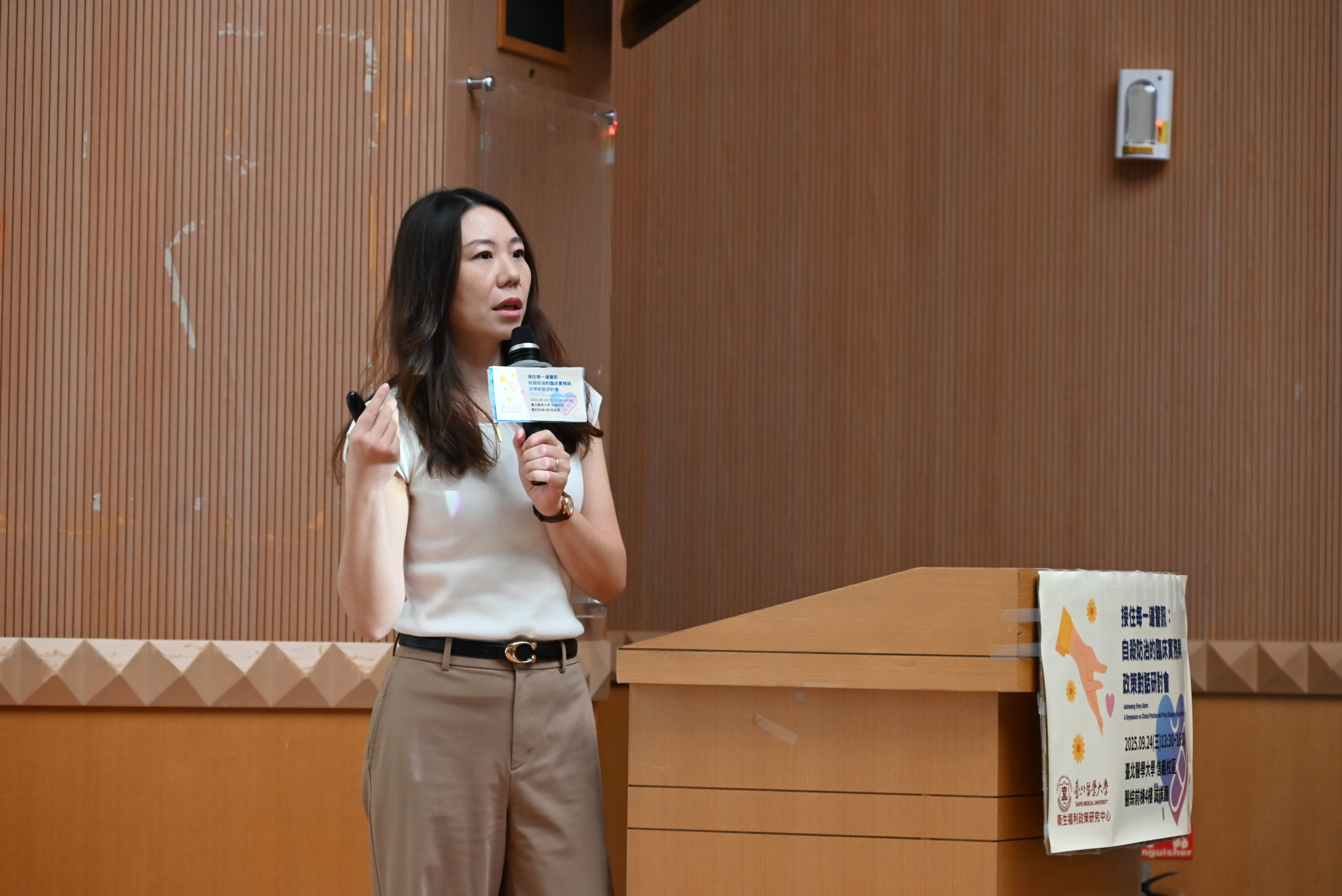
Director Hung noted that suicide has re-entered Taiwan’s top ten causes of death, underscoring its severity. Suicide, she explained, is not a single act but a process—from ideation to planning, attempt, and outcome. Suicide prevention must advance step by step, from health education and media advocacy, to psychological screening and psychiatric referral for inpatients, to emergency care and follow-up of high-risk individuals.
Research shows the highest suicide risk occurs within 30 days after discharge from the emergency department, making continuous care crucial. Tools such as SADPERSONS and SPS can assist clinicians in identifying high-risk groups. Hung also shared cases showing that schizophrenia, depression, borderline personality disorder, and alcohol use disorder all carry high suicide risks. She advocated for the CARE principle—Calm Concern, Acceptance, Respectful Referral, and Empowerment—as a support framework. Hung concluded: suicide is preventable, and everyone can be a gatekeeper if society works together across sectors to ensure early identification and timely intervention
Senior Clinical Psychologist Huang Yi-Lin, Department of Psychiatry, TMU Hospital
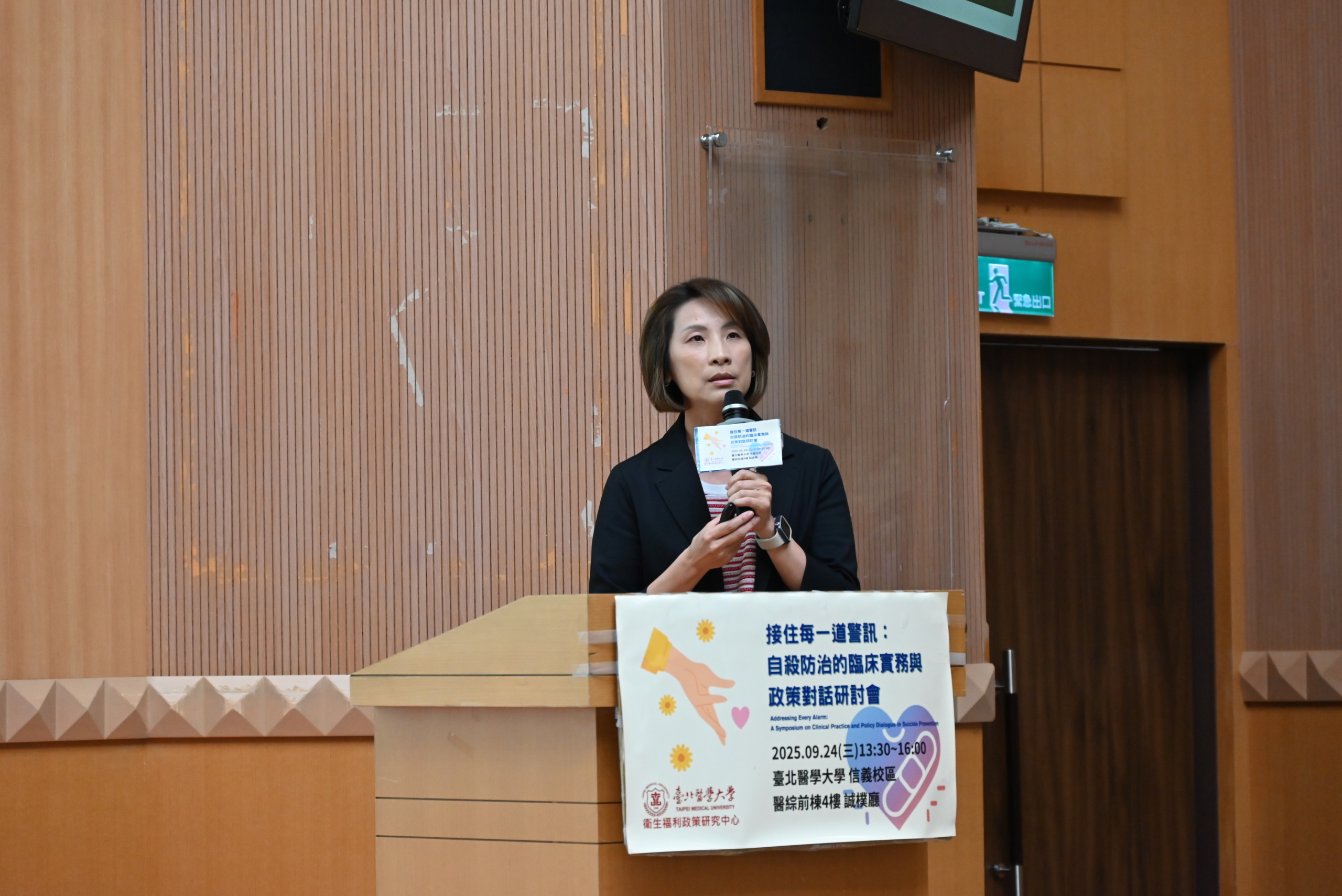
Psychologist Huang emphasized that suicide prevention is not only about stopping death, but also about helping individuals rediscover meaning and value in life. On the frontline, psychologists play a key role in prevention and crisis intervention. By forming therapeutic alliances and offering empathy, they help clients clarify issues, set phased goals, and reframe “wanting to end life” as “wanting to escape pain.” This gradual process nurtures hope and rebuilds purpose.
Huang shared the five principles of Safety Planning: identifying personal warning signs, building coping strategies, strengthening support networks, removing lethal means, and providing professional help channels. The goal is to give individuals a way to hold on through difficult moments. She also recommended policy reforms: integrating psychological counseling into standard care for high-risk cases, establishing regular supervision and occupational support for psychologists, expanding insurance coverage for therapy sessions, building a psychological services platform, adopting the “Zero Suicide” model, and increasing staffing in schools, workplaces, and communities.
Policy Recommendations
-
Strengthen suicide reporting and follow-up systems—currently, only 26.9% of suicide decedents had prior follow-up care. Coverage must expand to ensure high-risk groups are not missed.
-
Enhance post-emergency and post-discharge care, particularly within the 30-day “golden window” of highest suicide risk.
-
Build comprehensive prevention systems: public education, responsible media reporting, safer environments, and reduced access to lethal means. Improve access by raising awareness of the 1925 hotline and establishing digital counseling platforms.
-
Create intersectoral platforms linking healthcare, social services, education, and law enforcement. Integrate risk assessment tools (e.g., SADPERSONS, SPS), the CARE principle, and clinical resources for prevention, referral, and follow-up.
-
Advance psychologist system reforms: expand insurance coverage for psychotherapy, increase workforce and training, establish supervision systems, and adopt the Zero Suicide framework to prevent professional burnout.
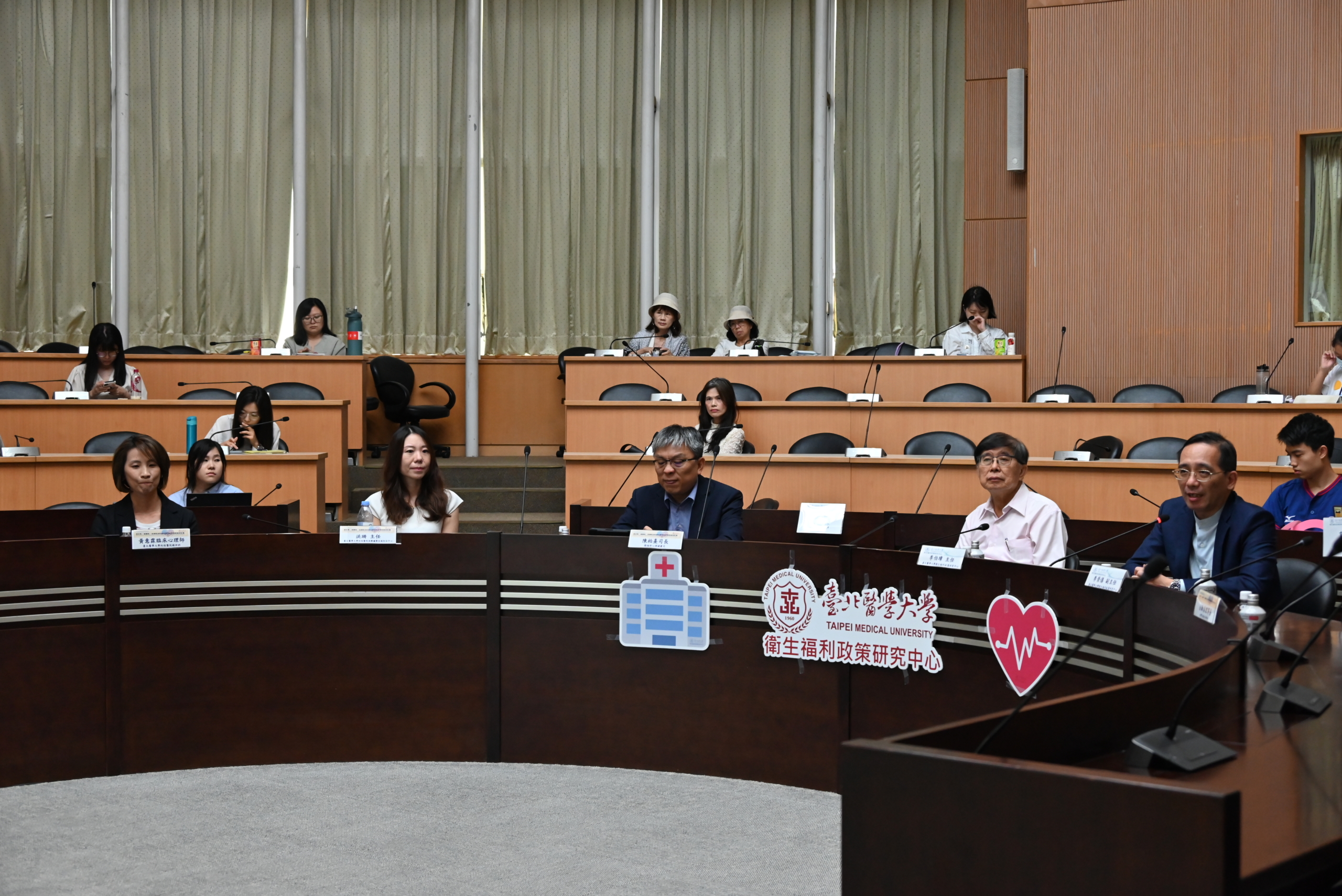
(From left to right: Senior Clinical Psychologist Huang Yi-Lin, TMU Hospital Department of Psychiatry; Director Hung Shan, TMU Hospital Addiction and Suicide Prevention Center; Director-General Chen Po-Hsi, Department of Mental Health, MOHW; Director Lee Po-Chang, TMU Health and Welfare Policy Research Center; and Deputy Director Li Chong-Hsi, TMU Health and Welfare Policy Research Center.)
Related News Links
-
2024.09.24, Suicide Returns to Top Ten Causes of Death: Nearly 80% of Men Not Reached—Reasons Revealed, China Times, https://www.chinatimes.com/realtimenews/20250924003894-260405?chdtv
-
2024.09.24, Suicide Back in Top Ten Causes of Death! Rising Rates Among Young and Middle-Aged; MOHW Promotes “Three-Tier Prevention Mechanism”, Mirror Media, https://www.mirrormedia.mg/story/20250924edi074
-
2024.09.24, TMU Health and Welfare Policy Research Center Hosts Suicide Prevention Clinical Practice Seminar, Calls for Building a Mental Health Platform, CNA, https://howlife.cna.com.tw/local/20250924s005.aspx
-
2024.09.24, Suicide Returns to Top Ten Causes of Death; MOHW Promotes Three-Level Prevention Strategy, Liberty Times, https://health.ltn.com.tw/article/breakingnews/5189718
-
2024.09.25, Taipei Medical University Health and Welfare Policy Research Center: Suicide Prevention Should Build Support Systems and Promote Psychologist System Reform, iTech, https://www.itech.tw/5859
-
2024.09.25, Suicide Returns to Top Ten Causes of Death; 80% of Men Do Not Seek Help, China Times, https://www.chinatimes.com/newspapers/20250925000496-260114?chdtv
-
2024.09.25, Suicide Returns to Top Ten Causes of Death After 14 Years! Greatest Increase Among Young and Middle-Aged; “Men Don’t Easily Shed Tears” Becomes the Biggest Shackle, Global Views, https://www.gvm.com.tw/article/124586
-
2024.09.25, Suicide Prevention Survey: Elderly Men Often Overlooked, United Daily News, https://udn.com/news/story/7266/9027617
-
2024.09.25, Another Campus Fall! Child and Adolescent Suicide Reports Increase Sixteenfold, Depression Identified as Main Cause, CTi News, https://ctinews.com/news/items/vNWO53qQxw



